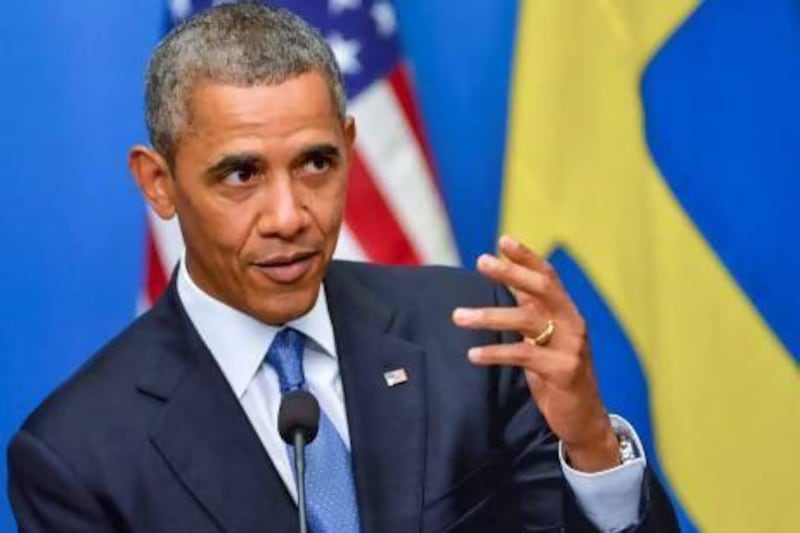On the eve of a two-day summit of the Group of 20 industrial powers, the Russian president, Vladimir Putin, has pointedly refused to rule out support for military strikes on Syria if the use of chemical weapons is "proved beyond doubt".
Mr Putin spoke amid concerns that strained relations between the United States and Russia would come under intense new pressure as the Syrian crisis looms over the G20 meeting starting today in St Petersburg.
He is likely to be pressed during the summit on the significance of his saying that Russia did not rule out supporting a United Nations Security Council resolution authorising force.
But he was careful to insist that Russia would only act in the event of the Security Council being handed absolute proof that the "regular army" of Bashar Al Assad's government had used chemical weapons against his own people.
If this is already a condition the US and France, its main ally in advocating force, would struggle to meet, Mr Putin was also unyielding on his essential argument. To mount military action without UN approval, he declared, would be an "aggression".
He claimed it would be "ludicrous" for the Assad regime to resort to chemical warfare just as it was graining ground against rebels.
The US president, Barack Obama, and Mr Putin will both aim to persuade world leaders of the wisdom of their directly opposing views on military intervention in Syria.
Some observers are predicting a cool if not acrimonious clash between the superpowers even though Syria is not even on the formal agenda.
For the heads of state, finance ministers and central bank officials gathering at the Strelna palace complex, the meeting is nominally a forum to discuss pressing economic issues, of which the world has many.
There appears to be no current plan for Mr Obama and Mr Putin to meet on the margins of the summit for face-to-face exchange of views. But there is also no doubt that Syria will be on many minds and lips.
Delegates will want to know whether Mr Obama proposes to go ahead with military strikes even if the US Congress, against expectation, follows the lead of the UK parliament and refuses to back such action when it votes next week.
Mr Obama, meanwhile, has powerful reason to believe US legislators will give him at least a qualified version of the endorsement he needs when they vote on Monday.
The US senate's foreign relations committee has agreed a draft resolution approving "limited and tailored use" of force, not extending to the deployment of ground troops and subject to a 60-day time limit. John Boehner, a key opposition figure as speaker of the House of Representatives, has voiced potentially crucial support.
The US president will also be reinforced by the undiminished commitment of the French president, Francois Hollande, in the face of stiff public opposition, to "punitive" strikes. The French parliament debated the issue yesterday but was not expected to vote on it and Mr Hollande, while not willing to conduct strikes alone, seems on course to join any US-led action.
Mr Hollande insisted the conflict did affect France and, in words that would have pleased Mr Obama, said later: "When a chemical massacre takes place, when the world is informed of it, when the evidence is delivered, when the guilty parties are known, then there must be an answer."
The stage is therefore set for what the London-based Financial Times described as a threat that the superpowers will hijack the G20 economic debate with their own "sniping, grandstanding and demagoguery".
"It's been like watching a slow-moving train wreck for nearly two years," Andrew Kuchins, a Russia expert at the Centre for Strategic and International Studies in Washington, DC, said. "Mr Putin and Mr Obama don't like each other at all. I think there's a deep degree of disrespect."
The US and Russian presidents have a history of prickly relations for reasons going beyond disagreement on Syria. Mr Obama was slow to congratulate Mr Putin on his electoral victory in May last year, planned meetings have been cancelled and the US is furious over Russia's refusal to return Edward Snowden, whistle-blower for some but traitor to others, to face espionage charges.
To one seasoned conflict mediator, the former British foreign secretary Lord Owen, it is the duty of other G20 leaders to use the summit to seek a breakthrough.
He called on such nations as Germany, India, Japan and Brazil to put pressure on Russia, Mr Al Assad's chief international ally, to push for diplomatic progress.
The British prime minister, David Cameron, whose plans to join a coalition taking action against Syria were wrecked by parliamentary and public opposition, has already let it be known he will push for a diplomatic solution.
US estimates put the death toll from the chemical attack near Damascus on August 21 at 1,429 including more than 400 children.
[ foreign.desk@thenational.ae ]
twitter: For breaking news from the Gulf, the Middle East and around the globe follow The National World. Follow us






